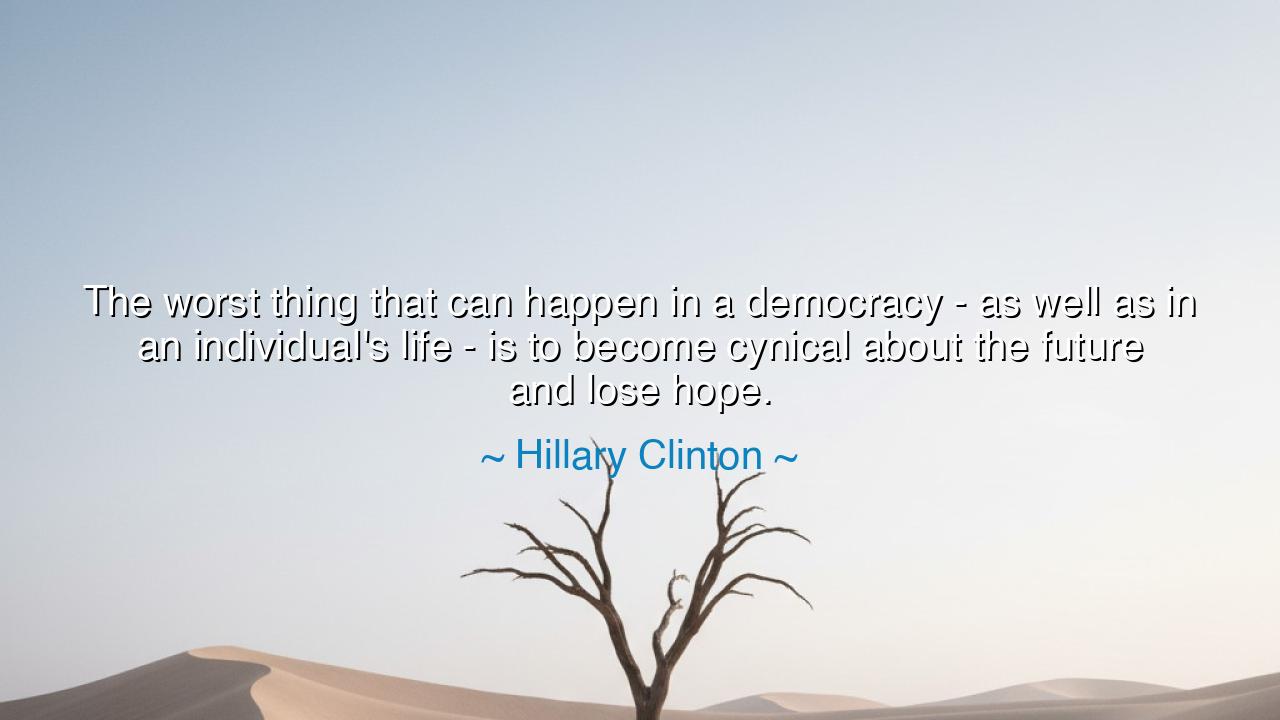
The worst thing that can happen in a democracy - as well as in an
The worst thing that can happen in a democracy - as well as in an individual's life - is to become cynical about the future and lose hope.






In the words of Hillary Clinton, we are reminded of one of the most profound dangers that can befall both a nation and an individual: the loss of hope and the rise of cynicism. Clinton warns that the greatest threat to the health of a democracy—and the soul of an individual—is the loss of faith in the future, the belief that change is impossible, and that all efforts are futile. When hope is lost, both the collective spirit of a society and the individual spirit of a person are diminished. This sense of hopelessness can lead to apathy, a quiet surrender to the belief that nothing will ever improve. In a democracy, where change is supposed to be a natural process of growth and renewal, cynicism is particularly dangerous, for it stifles the participation that keeps the nation vibrant and alive.
The ancient philosophers understood the destructive power of cynicism. In Plato’s Republic, he warns that when the spirit of a society turns away from virtue and justice, it becomes a shadow of itself. Just as Plato saw the consequences of lost hope in his ideal republic, so too can we see the erosion of faith in modern democracies. When a people begin to doubt the integrity of their leaders, their systems, and the future itself, they abandon the very principles that uphold the nation. Cynicism breeds disillusionment, and the result is a society that has lost its way, unable to move forward with conviction or unity. The same truth applies on an individual level: without hope, a person becomes weary and disconnected, losing their ability to strive for something greater than their immediate circumstances.
History is filled with examples of societies and individuals who have been brought to the brink of despair, only to find that the most profound strength lies in the ability to rekindle hope, even in the darkest times. Take the story of Winston Churchill during World War II. Britain faced the possibility of complete destruction, yet Churchill’s unwavering optimism and refusal to succumb to cynicism inspired a nation to fight on. His speeches, filled with hope, rekindled the spirit of the people, reminding them that despite the dire circumstances, they had the power to shape their own future. Churchill understood that the moment a people loses hope, they lose their will to fight for their freedom and their future. His leadership proved that the power of hope is greater than the force of fear or cynicism, and it was this belief that ultimately led to victory.
In the ancient Roman Empire, the fall of the Republic was marked by widespread disillusionment and cynicism. As the Republic grew increasingly corrupt and leaders served their own interests over the common good, the people became indifferent to the democratic process. The belief in the possibility of change diminished, and with it, the strength of the Roman people. This loss of hope paved the way for the rise of the Imperial system, a shift from the collective decision-making of the republic to the authoritarian rule of emperors. The fate of Rome serves as a stark reminder that a loss of hope—both in a nation and in the hearts of its citizens—can lead to the collapse of democratic ideals.
The lesson here is powerful: hope is not merely a passive feeling, but a driving force that shapes the future. Without hope, we lose the energy to act, to challenge the status quo, and to create a better world. Clinton’s warning is a call to action—she implores us to keep hope alive in our hearts and in our nations, for without it, we cannot create meaningful change. Just as the ancients understood that cynicism undermines progress, so too must we understand that only through faith in the future, in ourselves, and in each other, can we achieve greatness.
In our own lives, we must cultivate hope as a form of resilience. Whether we are faced with personal challenges or societal problems, the ability to look forward with hope, to see potential in the future, is what gives us the strength to keep moving forward. Cynicism may seem like an easy refuge in times of difficulty, but it is ultimately destructive. We must instead choose to believe that through our actions, we can make a difference, both for ourselves and for the world around us. As Martin Luther King Jr. once said, “Faith is taking the first step even when you don't see the whole staircase.” Hope and faith in the future are the fuel for progress.
Thus, let us reject the chains of cynicism and embrace the power of hope. It is in this hope that we find the courage to act, the strength to overcome challenges, and the vision to build a better future for ourselves and for the generations to come. Let us remember that both the individual and the democracy are bound by the same essential truth: hope is not merely a feeling, but a force that propels us forward, guiding us through the dark and toward the light of a better tomorrow.






AAdministratorAdministrator
Welcome, honored guests. Please leave a comment, we will respond soon